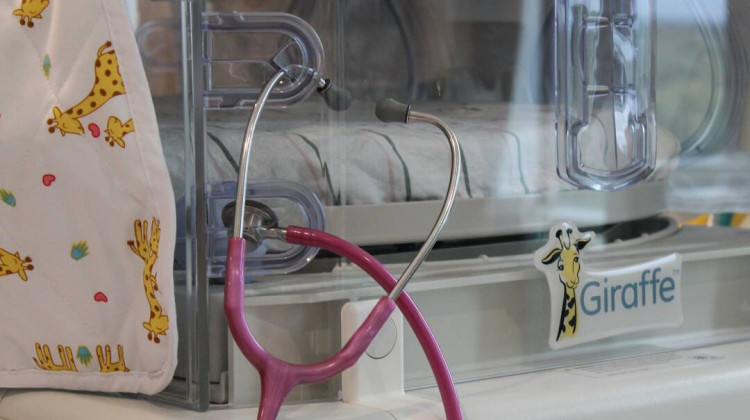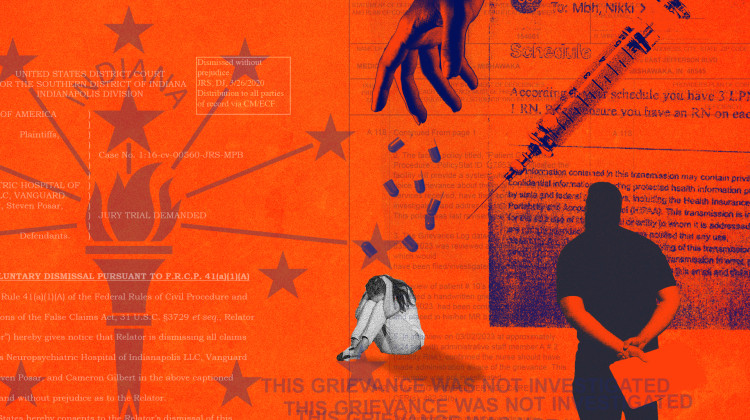
Aubrey Baker, right, and her mother, Lenore Williams, left, work in Indianapolis nursing facility Wildwood Healthcare Center. Baker contracted COVID-19 and has since recovered and returned to work the facility's COVID-19 patients.
Courtesy of Lenore WilliamsThis is part of Essential Voices, a series of interviews with people confronting COVID-19.
Nearly half of Indiana’s COVID-19 deaths have been in long-term care facilities. Twenty-three-year-old Aubrey Baker is a qualified medication aid at Wildwood Healthcare Center, a nursing facility in Indianapolis. Her mother, Lenore Williams, oversees the center. They spoke to reporter Lauren Bavis about how the virus has impacted their work, and how it hit close to home.
Lenore Williams: When COVID came, changes were coming every single day. You know, it would be one way on Monday and another way on Tuesday. We just kind of had to roll with the punches and get things set up so that we would be able to take care of the patients appropriately and try to minimize the effects of COVID.
Aubrey Baker: I've been working at Wildwood since I was 18 years old. I can be a certified nursing aide as well, which is where you care for the patients, clean them up, feed them, basically daily activities that they would need help with.
Hear more personal stories on COVID-19 from the America Amplified initiative
Williams: One of our patients had signs [of COVID-19]. And I knew that Aubrey had worked with the patient, but so had some other staff members as well. And then she had told me that her body was hurting.
Baker: At one point I was popping popcorn for a resident, and I had actually burnt it because I just stopped smelling. Like, my sense of smell went away out of nowhere. And I came out with the popcorn and I was taking it down the hall and they were like, ‘Aubrey, where are you going with that?’ I'm like, 'I'm going to take this to the lady, what do you mean?' And they're like, ‘That's burnt.’ And I'm like, 'No it's not.' And I opened the bag and it was just all black kernels.
Williams: We had the Indiana State Department of Health come out and do what they call a strike force visit. They will test a handful of residents and a handful of staff. She was one of the people that got tested. I think it was two days later they called, and they were going through the names and they went through all the patients first and they went through all the staffers, and she was the very last name. And none of the other staff members have been positive, so I had all this hope. And then they said her name and they're like, ‘Positive.’
As I was writing down the information, I remember my hand started getting a little shaky. I just had to still keep it together, because I'm on the phone, you know, with the state. And I was thinking to myself, you know, she's a very strong-willed individual. But still, with COVID being so new, a lot of the talk was surrounding the deaths. And I cried and I had to compose myself before I called her because she hates when I cry.
Baker: My body was aching. I had a headache on and off for consecutive days at a time. And I was extremely tired. Very tired. At one point my mom had brought me some things, you know, to help me feel better. Tea and little whiskey and, you know, some Vicks to clear that stuff out of my chest. And she thought I was in there dead or something because she was banging on the door and I didn't answer the door. She had been outside for at least 30 minutes to an hour. She went to her car and started crying. I felt terrible, but now I think it's pretty funny because she called everyone in the family about this.
Williams: I was freaking out, yes.
Baker: I stayed home in quarantine for 14 days. I actually came right back to work and worked on the COVID unit instead of working on the regular units, because I felt like I could better relate to the people and help them get stronger. And a lot of the people are depressed back there because, you know, how would you feel if you couldn't see your family members while you're at your lowest moment, you know what I mean? Like, this is probably the sickest they've ever been.
Williams: There's a lot of, I think, negativity that comes with nursing facilities. And a lot of times people don't understand what we do in here and how much we do give. I think that it goes to show, I mean, I gave my daughter. We only want the best for all of our patients.
Baker: If you don't find a job that you're willing to take risks for, I feel like you're just really in the wrong occupation. We're nurses, so being a nurse, that's what you signed up to do. You know, if I was in the army, I'm not going to say, ‘OK, I can't go to Afghanistan right now because I'm scared.’ You can definitely go get another job, but I love what I do. And she does too.
Contact reporter Lauren Bavis at lbavis@wfyi.org or follow her on Twitter @lauren_bavis
This story was produced by Side Effects Public Media, a news collaborative covering public health.
Side Effects, WFYI and Indiana Public Broadcasting are asking Americans about health issues, as part of America Amplified: Election 2020. The public media initiative, funded by the Corporation for Public Broadcasting, uses community engagement to inform and strengthen local, regional and national journalism. Follow on Twitter at @amplified2020.
If you have a personal story to share from the front lines of this pandemic, wherever that may be, email health@wfyi.org.
 DONATE
DONATE








 Support WFYI. We can't do it without you.
Support WFYI. We can't do it without you.